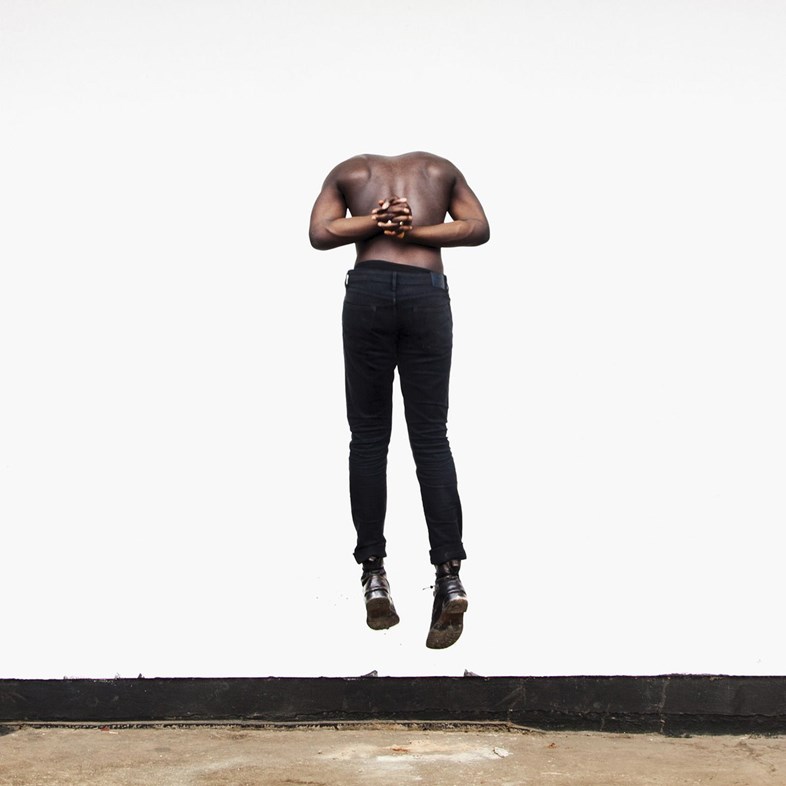After collaborating with some music heavyweights, the LA songster is doing his own thing, on his own terms – here he discusses independence, his new album and performing to marine biologists on a TED talk cruise
- TextJamie Milton
Over the last couple of years, the name Moses Sumney has been slowly creeping into the public consciousness, whispered from Los Angeles circles into the wider realm. His career began via word-of-mouth success – the 25-year-old collaborated with Solange on 2016’s A Seat at the Table, toured with James Blake, and performed with David Byrne as part of the Talking Heads legend’s Atomic Bomb! Supergroup tribute to William Onyeabor. The majority of those introduced to Sumney’s music arrived via big names such as these.
In fact, up until quite recently, you’d have been hard pressed to find a single headline that didn’t pair his name with Solange’s. “I think it’s a bit reductionist how often people rush to put your name with other proper nouns,” he admits, speaking from his home in LA. “And for me, that’s partly why there are no features on [my debut] album. People keep asking me if ‘so and so’ is on it. If they wrote or produced anything. Actually, no. Sorry. I needed to make the record I wanted to make. This is me.”

Sumney has spent a vast part of his life feeling at least slightly alone. Raised in San Bernardino, he moved to the Accra, Ghana, aged 10 and was bullied for his American heritage. Having started to write songs when he was 12, he returned to California aged 16 and began playing shows at 22. By this point, he’d already been pigeonholed as a potential soul star, or someone equally capable of fronting polished pop. It wasn’t until TV on the Radio’s Dave Sitek gave him a four-track recorder that he began to develop the scrappy intimacy of his early recordings, like 2014’s Mid-City Island.
On the cover of his debut album Aromanticism, out September 22, Sumney stands motionless and alone, one foot above ground, headless and with both arms tied behind his back. The striking image relates to Plato’s Symposium, which posits that humans were originally four-legged, four-armed and double-sexed. Believing that individuals were becoming too powerful, Zeus sliced them in half, making their heads face inwards. The only way a human could feel whole again would be to find a partner and become ‘complete’. Aromanticism isn’t strictly a concept album based around this Ancient Greek text, but it resonates very strongly with Sumney and the record explores lovelessness – the idea that humans aren’t themselves if they’re not attached to another person.
Highly personal, a lot of the album involved saying no, he explains. “For me, it was about not working with popular contemporary producers, people situated in what’s ‘modern’,” he says. “I did a lot of collaborations (the album features contributions from Thundercat and Majical Cloudz’s Matt Otto), but it had to be on my terms. It’s about knowing that if you bend to what’s popular, then you’ll always be endeavoured to that.” He doesn’t come across as at all guarded when speaking, but it’s clear he doesn’t want anyone interfering with his vision. He’s even tempted to make music under another name one day, as a means of dodging the spotlight. “When you’re a first name, last name artist, it’s even harder to do whatever you want,” he claims.
Aromanticism was made on the move, between Los Angeles mountains, Nicaragua and Montreal. One song, Quarrel, even stemmed from a trip across the Pacific Ocean, where Sumney performed to marine biologists on a TED talk cruise. “They asked me to come and sing. They needed a mental release, which was me basically,” he jokes. Another time, he found himself snowed in, stuck in a cabin on Christmas Day, with no power and a small amount of food to survive on. “It was horrible, really just a case of staying alive… I actually chopped an arm off in order to get out,” he jokes. “I had to burn it for heat. In fact that’s where the album art comes from.” The album doesn’t belong to one specific place or time. Instead, Sumney carried these thoughts in-between surreal events and the odd near-death experience. Most of the time, he was alone. The album’s concept “becomes more relevant to me every day,” he says.
Creating music centred around the idea of isolationism, Sumney even wants fans to come to his shows on their own. “Have a moment with yourself, for yourself,” he recently tweeted. “In general, experiencing things for yourself and coming to your own conclusions is really positive for personal growth. I like going to really emotional shows – I wanna experience that alone.” In other words, he wants people to turn up and cry like babies. “You said it, not me!” he laughs. “This is what I’m trying to do. I’m trying to tear them off from the people who love them, and I’ll have them where I want them! I can emotionally attack them. And then they can know what it’s like for me.”
Has he thought much about the music he wants to create in the future? “I will one day make music that’s considered more pop, or more accessible,” he says. “And then I’ll make weird ambient noise tracks, I’ll sing on other people’s stuff. I just think the sky’s the limit... Or outer space.”
Aromanticism is out September 22.











